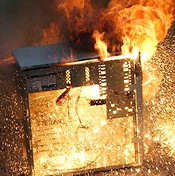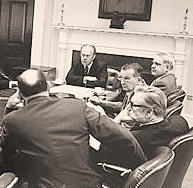
ABOVE: Skopje, Macedonia
The Bureau of Industry and Security (“BIS”) just released an order fining and denying export privileges for Micei International, a retailer of guns. police equipment, digital cameras and other miscellaneous items in Skopje, Macedonia. The order, which adopted a recommended order by an administrative law judge, arose from charges that Micei aided and abetted Yuri Malinkovski, aka Yuri Montgomery, in violating an order denying Malinkovski’s export privileges. Pursuant to that order, Micei was fined $126,000 and had its export privileges denied for 5 years.
Malinkovski’s export privileges were denied in 2000 based on his conviction for unlicensed exports of stun guns to Macedonia. According to the BIS charging letter and the adminstrative law judge’s decision adopted by the order, Micei had Malinkovski negotiate the purchases of various items, including shirts and boots, for export from the United States to Micei in Skopje. Although the documents are not entirely clear on this point, it appears that the items were exported not by Malinkowski but by the vendors with whom he was negotiating on Micei’s behalf.
Micei was charged with knowing violations under section 764.2(e) of the Export Administration Regulations. The basis for the claim that these were knowing violations is, to say the least, somewhat dubious. The ALJ’s recommended order noted two bases for this finding. One was that the denial order was published in the Federal Register and that therefore knowledge of the denial order could be “imputed” to Micei. “Imputed” knowledge is a thin reed on which to base a claim of actual knowledge, particularly where knowledge is imputed to a company in Macedonia based on a Federal Register notice. I don’t think I’m going out on a limb here when I say that it seems a stretch to expect a company in Skopje, Macedonia, to subscribe to and read each word of the Federal Register to make sure it wasn’t dealing with parties whose export privileges had been denied.
The ALJ order also noted that an officer of Micei knew that Malinkowski was subject to a denial order. This is a better basis for a claim of a knowing violation, but still somewhat short of a slam dunk. Since it appears that the items were being exported by the sellers, and not by Malinkovski, there is a reasonable possibility that Micei didn’t know that Malinkowski’s actions as a purchasing agent rather than as an exporter would violate that order. To the credit of the BIS’s final order, however, the agency relied only on this statement by the Micei officer, and not on the claim that Federal Register publication could be imputed knowledge, in finding a knowing violation.
(For those of you who click through the BIS link, prepare to be a bit confused because it appears that someone at BIS shuffled the pages before scanning them.)

 Posted by
Posted by  Category:
Category: 

 A helpful reader emailed me earlier today that some guy was so impressed with this blog that he decided to start his
A helpful reader emailed me earlier today that some guy was so impressed with this blog that he decided to start his  According to an
According to an  BJ Services, the Houston-based oil and gas field service provider, recently
BJ Services, the Houston-based oil and gas field service provider, recently  An
An 

